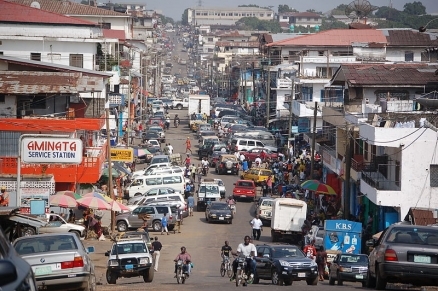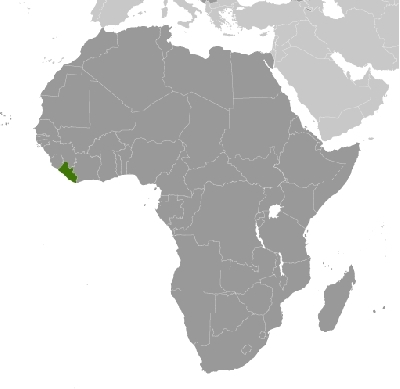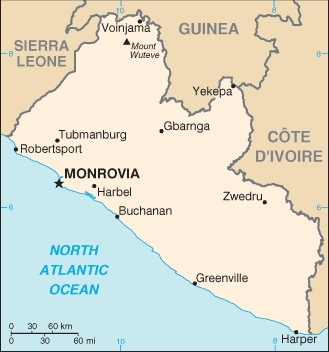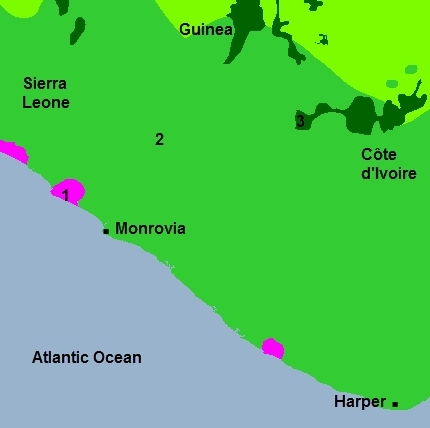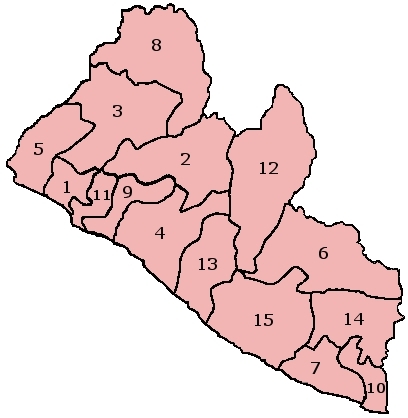Liberia
Countries and Regions of the World Collection  Liberia is a nation of nearly four million people in western-Africa, bordering the North Atlantic Ocean, between Côte d'Ivoire in the east and south and Sierra Leone in the northwest.
Liberia is a nation of nearly four million people in western-Africa, bordering the North Atlantic Ocean, between Côte d'Ivoire in the east and south and Sierra Leone in the northwest.
Liberia is mostly flat to rolling coastal plains rising to rolling plateau and low mountains in northeast. The coastline is characterized by lagoons, mangrove swamps, and river-deposited sandbars; while the inland grassy plateau supports limited agriculture.
Liberia's major environmental issues include:
- tropical rain forest deforestation;
- soil erosion;
- loss of biodiversity; and,
- pollution of coastal waters from oil residue and raw sewage.
It is susceptible to dust-laden harmattan winds which blow from the Sahara Desert from December to March.
Settlement of freed slaves from the United States in what is today Liberia began in 1822; by 1847, the Americo-Liberians were able to establish a republic. William Tubman, president from 1944-71, did much to promote foreign investment and to bridge the economic, social, and political gaps between the descendents of the original settlers and the inhabitants of the interior.
In 1980, a military coup led by Samuel Doe ushered in a decade of authoritarian rule.
In December 1989, Charles Taylor launched a rebellion against Doe's regime that led to a prolonged civil war in which Doe himself was killed. A period of relative peace in 1997 allowed for elections that brought Taylor to power, but major fighting resumed in 2000.
An August 2003 peace agreement ended the war and prompted the resignation of former president Charles Taylor, who faces war crimes charges in The Hague related to his involvement in Sierra Leone's civil war. After two years of rule by a transitional government, democratic elections in late 2005 brought President Ellen Johnson Sirleaf to power.
The UN Mission in Liberia (UNMIL) maintains a strong presence throughout the country, but the security situation is still fragile and the process of rebuilding the social and economic structure of this war-torn country continues.
Contents
Geography
Location: Western Africa, bordering the North Atlantic Ocean, between Côte d'Ivoire and Sierra Leone
Geographic Coordinates: 6 30 N, 9 30 W
Area: 111,370 km2 (96,320 km2 land and 15,050 km2 water)
arable land: 3.43%
permanent crops: 1.98%
other: 94.59% (2005)
Land Boundaries: 1,585 km. Border countries: Guinea 563 km, Côte d'Ivoire 716 km, Sierra Leone 306 km
Coastline: 579 km
Maritime Claims: territorial sea to 200 nautical miles
Natural Hazards: dust-laden harmattan winds blow from the Sahara (December to March)
Terrain: Mostly flat to rolling coastal plains rising to rolling plateau and low mountains in northeast.Its lowest point is the Atlantic Ocean (0 metres) and its highest point is Mount Wuteve (1,380 metres)
Climate: Tropical; hot, humid; dry winters with hot days and cool to cold nights; wet, cloudy summers with frequent heavy showers
Ecology and Biodiversity
|
1. Guinean mangroves 2. Western Guinean lowland forests Map source: World Wildlife Fund See also: People and SocietyPopulation: 3,887,886 (July 2012 est.) There are 16 ethnic groups that make up Liberia's indigenous population. The Kpelle in central and western Liberia is the largest ethnic group. Americo-Liberians who are descendants of freed slaves that arrived in Liberia after 1820 make up less than 5% of the population. |
Ethnic groups: Kpelle 20.3%, Bassa 13.4%, Grebo 10%, Gio 8%, Mano 7.9%, Kru 6%, Lorma 5.1%, Kissi 4.8%, Gola 4.4%, other 20.1% (2008 census)
Age Structure:
0-14 years: 44.3% (male 843,182/female 834,922)
15-64 years: 52.7% (male 989,623/female 1,007,577)
65 years and over: 2.9% (male 56,189/female 55,271) (2011 est.)
Population Growth Rate: 2.609% (2012 est.)
Birth Rate: 36.45 births/1,000 population (2012 est.)
Death Rate: 10.36 deaths/1,000 population (July 2012 est.)
Net Migration Rate: 0 migrant(s)/1,000 population (2012 est.)
Life Expectancy at Birth: 57.41 years
male: 55.82 years
female: 59.04 years (2012 est.)
Total Fertility Rate: 5.02 children born/woman (2012 est.)
Languages: English 20% (official), some 20 ethnic group languages, of which a few can be written and are used in correspondence
Literacy: 57.5% (2003 est.)
Urbanization: 48% of total population (2010) growing at a 3.4% annual rate of change (2010-15 est.)
History
Portuguese explorers established contacts with Liberia as early as 1461 and named the area Grain Coast because of the abundance of "grains of paradise" (Malegueta pepper seeds). In 1663 the British installed trading posts on the Grain Coast, but the Dutch destroyed these posts a year later. There were no further reports of European settlements along the Grain Coast until the arrival of freed slaves in the early 1800s.
The United States Congress appropriated $100,000 in 1819 for the establishment of Liberia "land of the free," (and resettlement of freemen and freed slaves from North America) by the American Colonization Society, led by prominent Americans such as Francis Scott Key, George Washington's nephew Bushrod, Henry Clay, Daniel Webster, and Presidents Monroe (for whom Liberian settlers named the capital, Monrovia), Adams, and Jackson. An initial group of 86 immigrants, who came to be called Americo-Liberians, established a settlement in Christopolis (now Monrovia, named after U.S. President James Monroe) on February 6, 1820. The United States, which officially recognized Liberia in 1862, shared particularly close relations with Liberia during the Cold War.
Thousands of freed American slaves and free African-Americans arrived during the following years, leading to the formation of more settlements and culminating in a declaration of independence of the Republic of Liberia on July 26, 1847. The drive to resettle freed slaves in Africa was promoted by the American Colonization Society (ACS), an organization of white clergymen, abolitionists, and slave owners founded in 1816 by Robert Finley, a Presbyterian minister. Between 1821 and 1867 the ACS resettled some 10,000 African-Americans and several thousand Africans from interdicted slave ships; it governed the Commonwealth of Liberia until independence in 1847.
In Liberia's early years, the Americo-Liberian settlers periodically encountered stiff and sometimes violent opposition from indigenous Africans, who were excluded from citizenship in the new Republic until 1904. At the same time, British and French colonial expansionists encroached upon Liberia, taking over much of its territory. Politically, the country was a one-party state ruled by the True Whig Party (TWP). Joseph Jenkins Roberts, who was born and raised in America, was Liberia's first President. The style of government and constitution was fashioned on that of the United States, and the Americo-Liberian elite monopolized political power and restricted the voting rights of the indigenous population. The True Whig Party dominated all sectors of Liberia from independence in 1847 until April 12, 1980, when indigenous Liberian Master Sergeant Samuel K. Doe (from the Krahn ethnic group) seized power in a coup d'etat. Doe's forces executed President William R. Tolbert and several officials of his government, mostly of Americo-Liberian descent. One hundred and thirty-three years of Americo-Liberian political domination ended with the formation of the People's Redemption Council (PRC).
Over time, the Doe government began promoting members of Doe's Krahn ethnic group, who soon dominated political and military life in Liberia. This raised ethnic tension and caused frequent hostilities between the politically and militarily dominant Krahns and other ethnic groups in the country. After the October 1985 elections, characterized by widespread fraud, Doe solidified his control. The period after the elections saw increased human rights abuses, corruption, and ethnic tensions. The standard of living further deteriorated. On November 12, 1985, former Army Commanding Gen. Thomas Quiwonkpa almost succeeded in toppling Doe's government. The Armed Forces of Liberia repelled Quiwonkpa's attack and executed him in Monrovia. Doe's Krahn-dominated forces carried out reprisals against Mano and Gio civilians suspected of supporting Quiwonkpa. Despite Doe's poor human rights record and questionable democratic credentials, he retained close relations with Washington. A staunch U.S. ally, Doe met twice with President Ronald Reagan and enjoyed considerable U.S. financial support.
On December 24, 1989, a small band of rebels led by Doe's former procurement chief, Charles Taylor, invaded Liberia from Cote d'Ivoire. Taylor and his National Patriotic Front rebels rapidly gained the support of many Liberians and reached the outskirts of Monrovia within 6 months. From 1989 to 1996 one of Africa's bloodiest civil wars ensued, claiming the lives of more than 200,000 Liberians and displacing a million others into refugee camps in neighboring countries. The Economic Community of West African States (ECOWAS) intervened in 1990 and succeeded in preventing Charles Taylor from capturing Monrovia. Prince Johnson--formerly a member of Taylor's National Patriotic Front of Liberia (NPFL)--formed the break-away Independent National Patriotic Front of Liberia (INPFL). Johnson's forces captured and killed Doe on September 9, 1990. Taking refuge in Sierra Leone and other neighboring countries, former AFL soldiers founded the new insurgent United Liberation Movement of Liberia for Democracy (ULIMO), fighting back Taylor's NPFL.
An Interim Government of National Unity (IGNU) was formed in Gambia under the auspices of ECOWAS in October 1990, headed by Dr. Amos C. Sawyer. Taylor (along with other Liberian factions) refused to work with the interim government and continued fighting. After more than a dozen peace accords and declining military power, Taylor finally agreed to the formation of a five-man transitional government. A hasty disarmament and demobilization of warring factions was followed by special elections on July 19, 1997. Charles Taylor and his National Patriotic Party emerged victorious. Taylor won the election by a large majority, primarily because Liberians feared a return to war had Taylor lost.
For the next 6 years, the Taylor government did not improve the lives of Liberians. Unemployment and illiteracy stood above 75%, and little investment was made in the country's infrastructure to remedy the ravages of war. Pipe-borne water and electricity were generally unavailable to most of the population, especially outside Monrovia, and schools, hospitals, roads, and infrastructure remained derelict. Rather than work to improve the lives of Liberians, Taylor supported the Revolutionary United Front in Sierra Leone. Taylor's misrule led to the resumption of armed rebellion from among Taylor's former adversaries. By 2003, armed groups called "Liberians United for Reconciliation and Democracy" (LURD) and "Movement for Democracy in Liberia" (MODEL), largely representing elements of the former ULIMO-K and ULIMO-J factions that fought Taylor during Liberia's previous civil war (1989-1996), were challenging Taylor and his increasingly fragmented supporters on the outskirts of Monrovia.
On June 4, 2003 in Accra, Ghana, ECOWAS facilitated peace talks among the Government of Liberia, civil society, and the LURD and MODEL rebel groups. On the same day, the Chief Prosecutor of the Special Court for Sierra Leone issued a press statement announcing the opening of a sealed March 7, 2003 indictment of Liberian President Charles Taylor for "bearing the greatest responsibility" for atrocities in Sierra Leone since November 1996. In July 2003 the Government of Liberia, LURD, and MODEL signed a cease-fire that all sides failed to respect; bitter fighting reached downtown Monrovia in July and August 2003, creating a massive humanitarian disaster.
On August 11, 2003, under intense U.S. and international pressure, President Taylor resigned office and departed into exile in Nigeria. This move paved the way for the deployment by ECOWAS of what became a 3,600-strong peacekeeping mission in Liberia (ECOMIL). On August 18, leaders from the Liberian Government, the rebels, political parties, and civil society signed a comprehensive peace agreement that laid the framework for constructing a 2-year National Transitional Government of Liberia (NTGL), headed by businessman Charles Gyude Bryant. The UN took over security in Liberia in October 2003, subsuming ECOMIL into the United Nations Mission in Liberia (UNMIL), a force that at one point numbered more than 12,000 troops and 1,148 police officers.
The October 11, 2005 presidential and legislative elections and the subsequent November 8, 2005 presidential run-off were the most free, fair, and peaceful elections in Liberia's history. Ellen Johnson Sirleaf defeated international soccer star George Weah 59.4% to 40.6% to become Africa's first democratically elected female president. She was inaugurated in January 2006. The president's Unity Party did not win control of the legislature, in which 9 of the 20 registered political parties were represented.
The political situation remained stable after the 2005 elections. President Johnson Sirleaf has enjoyed good relations with international organizations and donor governments, with whom she has worked closely on Liberia's development. A Truth and Reconciliation Commission (TRC) was established in 2005 to investigate and report on gross human rights violations that occurred in Liberia between January 1979 and October 2003. The TRC's final, edited report was released in late 2009. The Liberian Government has yet to address many of the recommendations.
The Johnson Sirleaf government won substantial donor support for its new poverty reduction strategy at the June 2008 Liberia Poverty Reduction Forum in Berlin, Germany. In order to maintain stability through the post-conflict period, Liberia's security sector reform efforts have led to the disarmament of more than 100,000 ex-combatants, the wholesale U.S.-led reconstruction of the Armed Forces of Liberia, and a UN-led effort to overhaul the Liberian National Police. The mandate of UNMIL was extended in September 2011 to September 2012. Within UNMIL's mandate is a Peacebuilding Commission focusing on promoting rule of law, security sector reform, and national reconciliation. However, the Government of Liberia has continued to avoid taking action on freezing assets of former President Charles Taylor and his supporters, as mandated by the UN Security Council.
Liberia’s executive and legislative branches brokered a compromise regarding the constitutional requirement for application of redistricting results (from the 2008 census) in preparation for 2011's presidential and legislative elections. In February, the National Elections Commission (NEC) completed voter registration (82% of the electorate) for those elections. As a necessary prelude, the NEC prepared a constitutional referendum for August 23, 2011 on individually-packaged amendments to: shorten the residency requirement from 10 to 5 years for presidential and vice-presidential candidates, increase the mandatory retirement age of Supreme Court justices from 70 to 75, move the date of national elections from the second Tuesday in October to the second Tuesday in November, and use a single-round, first-past-the-post (simple majority) method for all legislative and municipal elections while maintaining the two-round system for presidential elections. Approval by two-thirds of registered voters was required for ratification.
The October 11, 2011 presidential and legislative elections and the subsequent November 8, 2011 presidential run-off were declared free, fair, and transparent by ECOWAS, the African Union, the Carter Center, and other observers. The Congress for Democratic Change (CDC) alleged fraud in the first round and boycotted the run-off election. President Johnson Sirleaf defeated Winston Tubman of the CDC by 90.7% to 9.3% in the run-off to win re-election. She was inaugurated on January 16, 2012.
Government
Government Type: Republic
Liberia has a bicameral legislature consisting of an upper and lower chamber. Party structures remain weak, and politics continue to be personality-driven. Historically, the executive branch heavily influenced the legislature and judicial system.
Locally, political power emanates from traditional chiefs (town, clan, or paramount chiefs), mayors, and district commissioners. There are 15 counties in Liberia. The Supreme Court confirmed the president's power to appoint city mayors and county superintendents in a February 2009 ruling.
Capital: Monrovia - 882,000 (2009)
|
Administrative Divisions: 15 counties:
|
Source: Wikimedia Commons |
Independence Date: 26 July 1847
Legal System: dual system of statutory law based on Anglo-American common law for the modern sector and customary law based on unwritten tribal practices for indigenous sector. Liberia accepts compulsory International Court of Justice (ICJ) jurisdiction with reservations; and accepts International Criminal Court (ICCt) jurisdiction.
International efforts are aimed at shoring up the capacity of the judiciary. Liberia's court system is divided into four levels, including justices of the peace, courts of record (magistrate courts), courts of first instance (circuit and specialty courts), and the Supreme Court. Traditional courts and lay courts exist in rural areas of the country. Trial by ordeal, though officially outlawed, is practiced in various parts of Liberia. The formal judicial system remains hampered by severe shortages of qualified judges and other judicial officials.
Suffrage: 18 years of age; universal
International Environmental Agreements
Liberia is party to international agreements on: Biodiversity, Climate Change, Climate Change-Kyoto Protocol, Desertification, Endangered Species, Hazardous Wastes, Ozone Layer Protection, Ship Pollution, Tropical Timber 83, Tropical Timber 94, and Wetlands. It has signed, but not ratified agreements on: Environmental Modification, Law of the Sea, Marine Life Conservation
Foreign Relations
Liberia has maintained traditionally cordial relations with the West. China and Libya have been prominent international partners in Liberia's reconstruction. Liberia also maintains diplomatic relations with Cuba.
Liberia is a founding member of the United Nations and its specialized agencies and is a member of the African Union (AU), the Economic Community of West African States (ECOWAS), the African Development Bank (ADB), the Mano River Union (MRU), and the Non-Aligned Movement.
During the administration of Charles Taylor, relations between Liberia and its West African neighbors became seriously strained. West African countries backed by the African Union and the United Nations negotiated a peace agreement in Accra, Ghana that subsequently led to the exile of Charles Taylor to Nigeria in August 2003. With the election of Ellen Johnson Sirleaf, Liberia has seen significant improvements in relations with its West African neighbors and the wider world. Relations between Liberia and its immediate neighbors in the Mano River region are back on track, and efforts are underway to strengthen relations with other countries. Liberia signed a non-aggression pact with Sierra Leone when newly elected President Ernest Bai Koroma visited in September 2007. Liberia is a major proponent of regional integration.
Liberia has taken steps to forge closer ties with Western countries, especially the United States. President Ellen Johnson Sirleaf has visited several Western countries, including the United Kingdom, Sweden, Norway, Spain, France, and Germany. President Johnson Sirleaf has also visited China and Libya.
The outbreak of civil war in Liberia and the long dominance of Charles Taylor soured bilateral relations. However, Liberia now counts the United States as its strongest supporter in its democratization and reconstruction efforts. Since the end of Liberia's civil war in 2003, the United States has contributed over $1 billion in bilateral assistance and more than $1 billion in assessed contributions to the UN Mission in Liberia (UNMIL). In February 2008, President George W. Bush visited Liberia, where he held his fourth one-on-one meeting with President Johnson Sirleaf since her inauguration in January 2006. Peace Corps volunteers returned to Liberia in 2008 for the first time since 1990. Secretary of State Hillary Clinton paid an official visit to Liberia in August 2009. President Johnson Sirleaf met President Barack Obama and Secretary Clinton in Washington in May 2010. Secretary Clinton led the U.S. delegation to President Sirleaf’s inauguration on January 16, 2012.
The political impasse in Cote d’Ivoire over the November 28, 2010 presidential elections prompted more than 140,000 people to cross into Liberia as refugees. They inhabit the border region and belong to rival ethnic groups generally perceived as having supported either the legitimately elected president, Alassane Ouattara, or former president Laurent Gbagbo. Although the Ivoirian political stalemate has since been resolved, the humanitarian crisis affecting both the refugees and the receiving communities has lingered. Liberia’s coordination of, and support for, international relief efforts has been welcome.
Water
Total Renewable Water Resources: 232 cu km (1987)
Freshwater Withdrawal: Total: 0.11 cu km/yr (27% domestic, 18% industrial, 55% agricultural). Per capita: 34 cu m/yr (2000)
Access to improved drinking water supplies: 68% of population
Access to improved sanitation facilities: 17% of population
Agriculture
Agricultural Products: rubber, coffee, cocoa, rice, cassava (tapioca), palm oil, sugarcane, bananas; sheep, goats; timber
Irrigated Land: 30 sq km (2003)
Resources
Natural Resources: iron ore, timber, diamonds, gold, hydropower.
Energy
| Energy in Liberia | |||||
| Production | Consumption | Exports | Imports | Reserves | |
| Electricity | 335 million kWh (2008 est.) |
311.6 million kWh (2008 est.) |
0 kWh (2009 est.) |
0 kWh (2009 est.) |
|
| Oil | 0 bbl/day (2010 est.) |
4,500 bbl/day (2010 est.) |
23.37 bbl/day (2009 est.) |
4,552 bbl/day (2009 est.) |
0 bbl (1 January 2011 est.) |
| Natural Gas | 0 cu m (2009 est.) |
0 cu m (2009 est.) |
0 cu m (2009 est.) |
0 cu m (2009 est.) |
0 cu m 1 January 2011 est.) |
| Source: CIA Factbook | |||||
Health
Prevalence of HIV/AIDS in Adults: 5.9% (2003 est.)
Major Infectious Diseases:degree of risk: very high
food or waterborne diseases: bacterial and protozoal diarrhea, hepatitis A, and typhoid fever
vectorborne diseases: malaria and yellow fever
water contact disease: schistosomiasis
aerosolized dust or soil contact disease: Lassa fever
animal contact disease: rabies (2008)
Economy
Liberia is a low income country heavily reliant on foreign assistance for revenue.
Liberia was traditionally noted for its academic institutions, iron-mining, and rubber. Political upheavals beginning in the 1980s and a 14-year civil war (1989-2003) largely destroyed Liberia's economy and brought a steep decline in living standards. Civil war especially destroyed much of the infrastructure in and around the capital, Monrovia.
Liberia has the distinction of having the highest ratio of direct foreign investment to GDP in the world. Richly endowed with water, mineral resources, forests, and a climate favorable to agriculture,
The Liberian economy relied heavily on the mining of iron ore and on the export of natural rubber prior to the civil war. Liberia was a major exporter of iron ore on the world market. In the 1970s and 1980s, iron mining accounted for more than half of Liberia's export earnings. Following the coup d'etat of 1980, the country's economic growth rate slowed because of a decline in the demand for iron ore on the world market and political upheavals in Liberia. During the 1989-2003 civil war most major businesses were destroyed or heavily damaged, and most foreign investors and businesses left the country. Iron ore production stopped completely, and the United Nations banned timber and diamond exports from Liberia.
President Johnson Sirleaf, a Harvard-trained banker and administrator, has taken steps to reduce corruption, build support from international donors, and encourage private investment.
UN sanctions on Liberian timber were removed in 2006. Liberia shipped its first major timber exports to Europe in 2010.
Diamond sanctions were ended by the UN Security Council in April 2007, and Liberian diamond exports resumed through the Kimberley Process Certification Scheme.
Liberia’s economy has been growing modestly, despite the global economic downturn, and the International Monetary Fund (IMF) projects strong GDP growth through 2012. The inflation rate in 2011 averaged 10%. The country's revenues come primarily from rubber exports and revenues from its maritime registry program. Liberia’s U.S.-owned and operated shipping and corporate registry (LISCR) is the world’s second-largest (more than 3,500 ships whose total exceeds 113 million gross tons, which is over 10% of the world’s oceangoing fleet); its Liberian-flagged vessels carry more than one-third of U.S.-imported oil. There is increasing interest in the possibility of commercially exploitable offshore crude oil deposits along Liberia's Atlantic Coast. In 2010, President Johnson Sirleaf signed a 3-year deal with Chevron to explore for oil offshore. Exploitation of gold deposits should contribute to government revenues and provide employment.
Reform Efforts
Liberia concluded its Governance and Economic Management Assistance Program (GEMAP) in September 2009. The country cleared its arrears to the World Bank, International Monetary Fund, and African Development Bank (approximately $1.6 billion). It reached Heavily Indebted Poor Countries (HIPC) completion point in June 2010, and it cleared nearly $1.4 billion in arrears to Paris Club creditors in September 2010. The government's 3-year poverty reduction strategy was scheduled to end in June 2011. The same month, the IMF approved a continuation of Liberia's Extended Credit Facility (ECF) through March 2012.
Reform of the budget process continues. The government publishes detailed copies of the final budget and quarterly fiscal outturns. The final 2010-2011 fiscal year budget of $369 million (ending June 30, 2011) was 6.3% higher than the initial budget submitted to the legislature, although 0.5% lower than the final budget the previous year. In FY 2010-2011, the Liberian Government committed to allocating 60% of its budget to poverty reduction strategy goals, and its expenditures for health and education increased by 10%. Low-income taxpayers received a tax break in 2010, with their effective tax rate dropping from 25% to 20%. U.S. Treasury advisors are working with the Ministry of Finance to improve tax administration, strengthen internal controls, and increase revenue collection.
Liberia is open to foreign investment. The government announced 39 reforms to the business climate in 2008 and 2009, and the country attracted over $100 million in new investment in the first half of 2009. The Liberia Extractive Industries Transparency Initiative (LEITI) continues to operate successfully, and Liberia was only the second country to obtain EITI compliance. In 2010, the government enacted several pieces of legislation to modernize commercial transactions and expand commercial activities. In fall 2010, Liberia became the first West African country to enact a Freedom of Information Act. The government is trying to privatize the Freeport of Monrovia, which will lower import costs for consumables and capital equipment. In early September 2010, Delta Airlines inaugurated direct flights between Atlanta and Monrovia.
Remaining Challenges
Despite rich natural resources and potential for self-sufficiency in food production, Liberia’s economy remains less competitive because of the high cost of operating in country. Productive capacity and sustained economic growth are depressed by high unemployment, low literacy, poor health, corruption, and the absence of basic infrastructure such as adequate roads and water, sewage, and electrical services. Limitations on local human resources and the need for private security services also drive up the costs of doing business. Only about 15% of the workforce is employed in the formal sector. The adult literacy rate is estimated at less than 60%, and 68% of Liberians live below the poverty line. Although Liberia’s HIV/AIDS rate is under 2% and the government is conducting prevention campaigns, an estimated 35% of Liberians are malnourished, only 28% are fully immunized, just 25% have access to safe drinking water, and only 36% have access to proper sanitation. The costs of rebuilding damaged infrastructure are enormous. The economy is heavily dependent on the infusion of funds made available by international donors, the presence of the UNMIL peacekeeping force, and international non-governmental organizations (NGOs). Foreign assistance ($425 million) still exceeds the national budget.
Ongoing economic reforms are squeezing entrenched interests, possibly leading to stronger resistance to further reform. Delays in initiating transparent, commercially sustainable export of timber continue to have a negative impact on the budget. Concerns about possible corruption and lack of transparency in timber, iron ore, and agricultural contracts increase the uncertainty of the investment climate and threaten the resumption of these once-vibrant industries. The ongoing dominance of the import and wholesale/retail economy by Lebanese and Asian businesspeople continues to breed resentment. The government still favors policies protecting Liberian ownership of some sectors of the economy. Laws limit foreign employment in particular sectors, even, in practice, when a qualified Liberian may not be available. These laws have discouraged long-term investment by foreign-owned/operated businesses. Modernization in the sectors reserved for Liberians has been hampered by lack of capital and technical expertise. Liberian nationality laws restrict citizenship (and thus land ownership) to those of “Negro descent.”
Despite having enacted laws on intellectual and industrial property and copyright, the government has failed to enforce these laws. There is widespread sale of pirated CDs, counterfeit drugs, and knock-off electronic products. Persistent corruption and a culture of patronage inhibit open and transparent concession and procurement processes. The Public Procurement and Concessions Commission and the Liberia Anti-Corruption Commission (LACC) have yet to develop the capacity and political will to offset fully these influences. Efforts to reform the procurement process at government ministries and agencies have slowed government expenditure and continue to falter due to lack of institutional capacity.
GDP (Purchasing Power Parity): $1.836 billion (2011 est.)
GDP (Official Exchange Rate): $1.2 billion (2011 est.)
GDP- per capita (PPP): $400 (2011 est.)
GDP- composition by sector:
agriculture: 76.9%
industry: 5.4%
services: 17.7% (2002 est.)
Population Below Poverty Line: 80% (2000 est.)
Industries: rubber processing, palm oil processing, timber, diamonds
Exports: rubber, timber, iron, diamonds, cocoa, coffee
Export Partners: Malaysia 22.1%, South Africa 18.1%, Poland 14.9%, Germany 9.2%, US 8.4%, Spain 6.6%, South Korea 4.8%, [[]Norway] 4.4% (2006)
Imports: fuels, chemicals, machinery, transportation equipment, manufactured goods; foodstuffs
Import Partners: South Korea 38.2%, Singapore 19.4%, Japan 13.1%, China 10.2% (2006)
Economic Aid Recipient: $236.2 million (2005)
Currency: Liberian dollar (LRD)
Ports and Terminals: Buchanan, Monrovia
